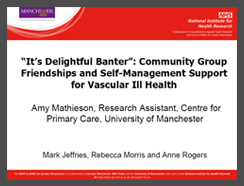CLAHRC GM present at British Sociological Association Conference

Insightful research from the CLAHRC Greater Manchester, on the role of third sector groups in the self-management of long term vascular conditions, was shared at this year’s British Sociological Association (BSA) Medical Sociology Conference at the University of York.
Amy Mathieson, Research Assistant at the CLAHRC GM, gave a presentation which offered an overview of part of the VOCALS study.
The aim of VOCALS was to explore the role of community and voluntary groups in supporting individuals to manage their long-term vascular condition. It focused on the patient context and networks used to implement new forms of self-management support for people with vascular conditions.
The conference, which celebrated its 45th anniversary this year, offers academics an opportunity to share and discuss research and developments in medical sociology.
Amy said: “Friendships tend to receive less attention in medical sociology than research on the family. With an increase in divorce, single person households and life expectancy, there is now a need for research to de-centre the family and explore other sources of support for long-term condition management. This study explored the role of third-sector groups in the self-management of long-term vascular conditions.” During the study, twenty participants, who were self-diagnosed as having diabetes, heart disease or Chronic Kidney Disease, were recruited from a range of voluntary groups.
Following a series of interviews with participants, the complex nature of friendships and details on how friend-like relations were formed and how this relationship helped with the day-to-day management of their chronic illness was analysed.
Amy added: “There was a distinction between friends inside and outside of the group; friends formed in the group played a specific role in the respondents’ illness management. Respondents often disliked burdening their family and friends outside of the group by discussing their health. The group therefore offered ‘a space to moan’, where the participants could share their experiences without feeling guilty. Friends inside the group were seen as comforters, ‘cheering people up’, and offering advice. This support was not restricted to health specific groups. Medical Sociology could benefit from exploring how relationships, formed in different settings, influence engagement with long-term condition management.”
The presentation can be viewed here.
Date Published: 17/09/2013